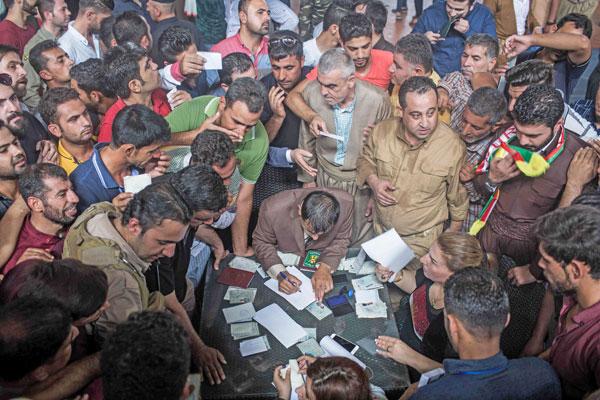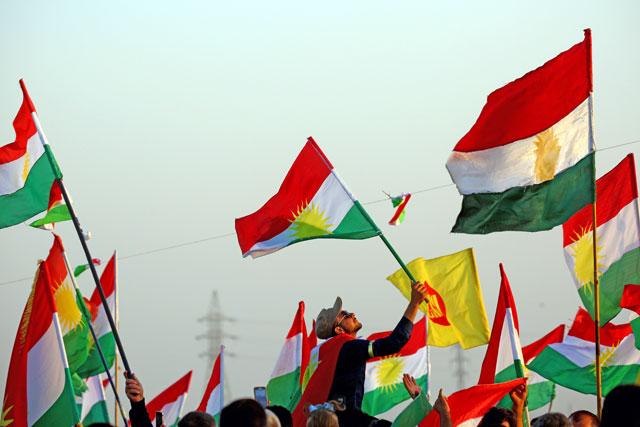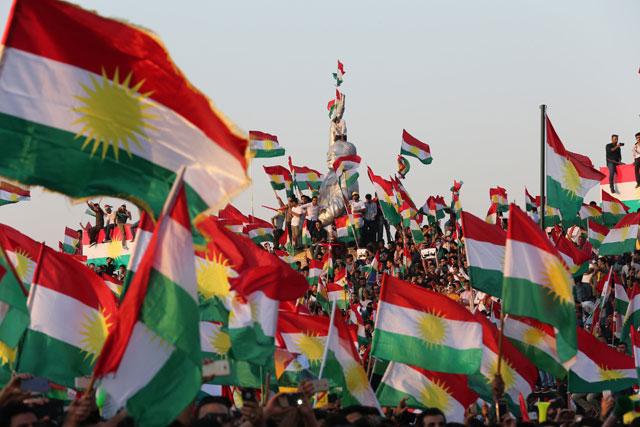You are here
Big ‘yes’ vote expected for Iraqi Kurd independence
By AFP - Sep 27,2017 - Last updated at Sep 27,2017

Iraqi Kurds wait to check their identities before voting in the Kurdish independence referendum at a stadium in Erbil which is being used as a polling station on Monday (AFP photo)
ERBIL, Iraq — Iraq’s Kurds were Tuesday expecting the announcement of a big “yes” vote for independence, as authorities in Baghdad weighed how to respond to a referendum they considered illegal.
Large numbers turned out in northern Iraq’s autonomous Kurdistan region for Monday’s vote, which went ahead despite fierce objections from Baghdad, Turkey and Iran.
Votes were still being counted on Tuesday, with results expected by the end of the day and no doubt of an overwhelming outcome in favour of independence.
The vote is nonbinding and will not lead automatically to independence, but is seen by the Kurds as a major step towards a long-cherished dream of statehood.
In the regional capital Erbil, a night of fireworks, flag-waving and dancing in the streets followed the vote.
“We made a Kurdish state today,” Erbil resident Ahmad told AFP during the celebrations.
“We’re Kurdish people, we’re not Arab, we’re not Persian, we’re no one else... We’re Kurds and we’ll remain Kurds forever.”
The referendum took place peacefully, but has increased tensions between the Iraqi Kurds and their neighbours, raising fears of potential unrest.
Iraq Prime Minister Haider Al Abadi declared before the vote that he would take “necessary measures” to protect the country’s unity and he was due to meet parliament members on Wednesday.
Iraqi lawmakers voted on Tuesday to send troops to disputed areas where the referendum took place, but there have been no signs of a deployment so far.
Turkey warns of ‘ethnic war’
Analysts say Baghdad is deeply concerned by the vote but unlikely to seek a confrontation with the Kurds for now, especially as Iraqi forces continue to battle the Daesh terror group in its final bastions.
Turkey, concerned the vote will stoke the separatist ambitions of its own sizeable Kurdish population, repeatedly condemned the vote as wrong-headed and dangerous.
On Tuesday, President Recep Tayyip Erdogan warned the Iraqi Kurds and their long-time leader Massud Barzani risked sparking an “ethnic war”.
“If Barzani and the Kurdistan Regional Government do not go back on this mistake as soon as possible, they will go down in history with the shame of having dragged the region into an ethnic and sectarian war,” Erdogan said in a televised speech.
Erdogan warned on polling day that Turkey would shut its border with Iraqi Kurdistan and threatened to block key exports that flow from the region through Turkish territory.
He even suggested the possibility of a cross-border incursion similar to the one Turkish forces have carried out against Daesh and Kurdish fighters in Syria.
Iraqi soldiers were seen on Tuesday taking part in a Turkish military drill launched last week in the southern province of Sirnak close to the Iraqi border.
An AFP photographer saw soldiers holding Turkish and Iraqi flags while on the move and on tanks during the exercise in the Silopi district.
Monday’s vote took place across the three northern provinces of autonomous Iraqi Kurdistan — Erbil, Sulaimaniyah and Dohuk — as well as in disputed border zones such as the oil-rich province of Kirkuk.
Kirkuk curfew lifted
A curfew was lifted early Tuesday on parts of the city of Kirkuk, where it had been imposed on the city centre and non-Kurdish neighbourhoods over fears of unrest connected with the vote.
Officials reported that turnout for the referendum stood at 72 per cent, with 3.3 million of the 4.58 million registered voters taking part.
Participation was lower in some parts of the region and was at only 50 per cent in Sulaimaniyah province, the home base of political forces opposed to Barzani.
Barzani’s opponents have accused the longtime regional chief of seeking to empower himself through the vote and said he should have accepted a UN-backed plan to put off the referendum in favour of negotiations with Baghdad.
The United Nations and United States urged Barzani to cancel or postpone the vote, with Washington especially concerned it could hamper the fight against Daesh in which Kurdish peshmerga forces have been vital.
‘Political chaos’
Issam Al Fayli, a political science professor at Baghdad University, said he did not expect any immediate confrontations.
“The Iraqi government will take its time to make decisions, taking special account of the opinions of military leaders because the current priority for Iraq is the war against Daesh,” he said, using an Arabic name for IS.
“There will be some minor incidents but the crisis should in the end remain under control.”
Iran, which like Turkey has a large and restless Kurdish population, also opposed the referendum.
Ali Akbar Velayati, chief foreign policy adviser to Iran’s supreme leader, said after the vote that it would sow “political chaos in the region”.
“The honourable people of Kurdistan will not bear this disgrace,” he said, according to the semi-official ISNA news agency.
Left without a state of their own when the borders of the Middle East were redrawn after World War I, the Kurds see themselves as the world’s largest stateless people.
The non-Arab ethnic group number between 25 and 35 million people spread across Iraq, Iran, Turkey and Syria.
Related Articles
ERBIL, Iraq — Iraq’s Kurds faced the threat of growing isolation Thursday after a massive “yes” vote for independence in a referendum that h
ERBIL Iraq — Iraqi Kurds were preparing to vote in a referendum set for Monday on independence for their autonomous northern region, d
ERBIL, Iraq — Iraqi Kurds voted in an independence referendum Monday as tensions rose with Baghdad and neighbouring countries over the histo



















